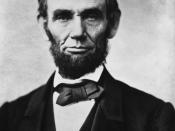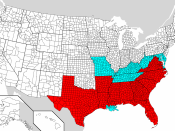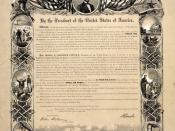[Type the company name] |
The Emancipation Proclamation |
[Type the document subtitle] |
�
The Emancipation Proclamation, said to take effect on January 1, 1863, was not simply about freeing the slaves. In fact, Lincoln had stated in a letter to the editor Horace Greeley in August 1862, "If I could save the Union without freeing any slave, I would do it, and if I could save it by freeing some and leaving others alone, I would also do that." �
The Emancipation Proclamation, although addressing the issue of slavery, was never really about slavery. Lincoln was a patriot; he loved his country and wanted what was best for it. He saw the issue of slavery, not as the injustice we do today, but as in justice to the survival of the Union. In order for the Union to survive the war, and for our nation to succeed, slavery could not exist within it.
Some historians say Lincoln's disdain for slavery and their treatment began in childhood. Other historians believe that the move had far more to do with economics than with slavery, as Lincoln himself once said his family had moved, "partly on account of slavery, but chiefly on account of difficulty in land titles in Kentucky." �
While the issue of when, or even why Lincoln began to dislike slavery can be continuously debated, it is certain that he did not want it for the United States of America. Lincoln knew that the Emancipation Proclamation would be a defining moment not only for his presidency, but also for him, as a man. "If my name ever goes into history, it will be for this act." �
Many similarities could be made between the Revolutionary War, and the Civil War. Lincoln did not want the south to parallel the...


